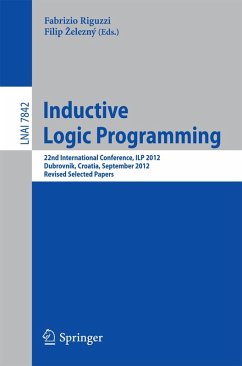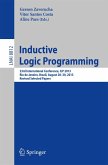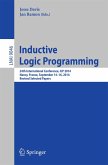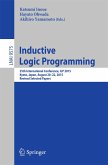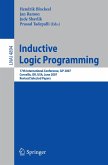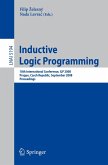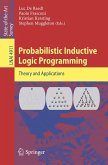Inductive Logic Programming (eBook, PDF)
22nd International Conference, ILP 2012, Dubrovnik, Croatia, September 16-18,2012, Revised Selected papers
Redaktion: Riguzzi, Fabrizio; Zelezny, Filip
36,95 €
36,95 €
inkl. MwSt.
Sofort per Download lieferbar

18 °P sammeln
36,95 €
Als Download kaufen

36,95 €
inkl. MwSt.
Sofort per Download lieferbar

18 °P sammeln
Jetzt verschenken
Alle Infos zum eBook verschenken
36,95 €
inkl. MwSt.
Sofort per Download lieferbar
Alle Infos zum eBook verschenken

18 °P sammeln
Inductive Logic Programming (eBook, PDF)
22nd International Conference, ILP 2012, Dubrovnik, Croatia, September 16-18,2012, Revised Selected papers
Redaktion: Riguzzi, Fabrizio; Zelezny, Filip
- Format: PDF
- Merkliste
- Auf die Merkliste
- Bewerten Bewerten
- Teilen
- Produkt teilen
- Produkterinnerung
- Produkterinnerung

Bitte loggen Sie sich zunächst in Ihr Kundenkonto ein oder registrieren Sie sich bei
bücher.de, um das eBook-Abo tolino select nutzen zu können.
Hier können Sie sich einloggen
Hier können Sie sich einloggen
Sie sind bereits eingeloggt. Klicken Sie auf 2. tolino select Abo, um fortzufahren.

Bitte loggen Sie sich zunächst in Ihr Kundenkonto ein oder registrieren Sie sich bei bücher.de, um das eBook-Abo tolino select nutzen zu können.
This book constitutes the thoroughly refereed post-proceedings of the 22nd International Conference on Inductive Logic Programming, ILP 2012, held in Dubrovnik, Croatia, in September 2012.
The 18 revised full papers were carefully reviewed and selected from 41 submissions. The papers cover the following topics: propositionalization, logical foundations, implementations, probabilistic ILP, applications in robotics and biology, grammatical inference, spatial learning and graph-based learning.
- Geräte: PC
- ohne Kopierschutz
- eBook Hilfe
- Größe: 6.39MB
Andere Kunden interessierten sich auch für
![Inductive Logic Programming (eBook, PDF) Inductive Logic Programming (eBook, PDF)]() Inductive Logic Programming (eBook, PDF)32,95 €
Inductive Logic Programming (eBook, PDF)32,95 €![Inductive Logic Programming (eBook, PDF) Inductive Logic Programming (eBook, PDF)]() Inductive Logic Programming (eBook, PDF)38,95 €
Inductive Logic Programming (eBook, PDF)38,95 €![Inductive Logic Programming (eBook, PDF) Inductive Logic Programming (eBook, PDF)]() Inductive Logic Programming (eBook, PDF)40,95 €
Inductive Logic Programming (eBook, PDF)40,95 €![Inductive Logic Programming (eBook, PDF) Inductive Logic Programming (eBook, PDF)]() Inductive Logic Programming (eBook, PDF)40,95 €
Inductive Logic Programming (eBook, PDF)40,95 €![Inductive Logic Programming (eBook, PDF) Inductive Logic Programming (eBook, PDF)]() Inductive Logic Programming (eBook, PDF)40,95 €
Inductive Logic Programming (eBook, PDF)40,95 €![Probabilistic Inductive Logic Programming (eBook, PDF) Probabilistic Inductive Logic Programming (eBook, PDF)]() Probabilistic Inductive Logic Programming (eBook, PDF)40,95 €
Probabilistic Inductive Logic Programming (eBook, PDF)40,95 €![Inductive Logic Programming (eBook, PDF) Inductive Logic Programming (eBook, PDF)]() Inductive Logic Programming (eBook, PDF)40,95 €
Inductive Logic Programming (eBook, PDF)40,95 €-
-
-
This book constitutes the thoroughly refereed post-proceedings of the 22nd International Conference on Inductive Logic Programming, ILP 2012, held in Dubrovnik, Croatia, in September 2012.
The 18 revised full papers were carefully reviewed and selected from 41 submissions. The papers cover the following topics: propositionalization, logical foundations, implementations, probabilistic ILP, applications in robotics and biology, grammatical inference, spatial learning and graph-based learning.
The 18 revised full papers were carefully reviewed and selected from 41 submissions. The papers cover the following topics: propositionalization, logical foundations, implementations, probabilistic ILP, applications in robotics and biology, grammatical inference, spatial learning and graph-based learning.
Dieser Download kann aus rechtlichen Gründen nur mit Rechnungsadresse in A, B, BG, CY, CZ, D, DK, EW, E, FIN, F, GR, HR, H, IRL, I, LT, L, LR, M, NL, PL, P, R, S, SLO, SK ausgeliefert werden.
Produktdetails
- Produktdetails
- Verlag: Springer Berlin Heidelberg
- Seitenzahl: 273
- Erscheinungstermin: 4. Juni 2013
- Englisch
- ISBN-13: 9783642388125
- Artikelnr.: 44125662
- Verlag: Springer Berlin Heidelberg
- Seitenzahl: 273
- Erscheinungstermin: 4. Juni 2013
- Englisch
- ISBN-13: 9783642388125
- Artikelnr.: 44125662
- Herstellerkennzeichnung Die Herstellerinformationen sind derzeit nicht verfügbar.
A Relational Approach to Tool-Use Learning in Robots.- A Refinement Operator for Inducing Threaded-Variable Clauses.- Propositionalisation of Continuous Attributes beyond Simple Aggregation.- Topic Models with Relational Features for Drug Design.- Pairwise Markov Logic.- Evaluating Inference Algorithms for the Prolog Factor Language.- Polynomial Time Pattern Matching Algorithm for Ordered Graph Patterns.- Fast Parameter Learning for Markov Logic Networks Using Bayes Nets.- Bounded Least General Generalization.- Itemset-Based Variable Construction in Multi-relational Supervised Learning.- A Declarative Modeling Language for Concept Learning in Description Logics.- Identifying Driver's Cognitive Load Using Inductive Logic Programming.- Opening Doors: An Initial SRL Approach.- Probing the Space of Optimal Markov Logic Networks for Sequence Labeling.- What Kinds of Relational Features Are Useful for Statistical Learning?.- Learning Dishonesty.- Heuristic Inverse Subsumption in Full-Clausal Theories.- Learning Unordered Tree Contraction Patterns in Polynomial TimeA Relational Approach to Tool-Use Learning in Robots.- A Refinement Operator for Inducing Threaded-Variable Clauses.- Propositionalisation of Continuous Attributes beyond Simple Aggregation.- Topic Models with Relational Features for Drug Design.- Pairwise Markov Logic.- Evaluating Inference Algorithms for the Prolog Factor Language.- Polynomial Time Pattern Matching Algorithm for Ordered Graph Patterns.- Fast Parameter Learning for Markov Logic Networks Using Bayes Nets.- Bounded Least General Generalization.- Itemset-Based Variable Construction in Multi-relational Supervised Learning.- A Declarative Modeling Language for Concept Learning in Description Logics.- Identifying Driver's Cognitive Load Using Inductive Logic Programming.- Opening Doors: An Initial SRL Approach.- Probing the Space of Optimal Markov Logic Networks for Sequence Labeling.- What Kinds of Relational Features Are Useful for StatisticalLearning?.-Learning Dishonesty.-Heuristic Inverse Subsumption in Full-Clausal Theories.-Learning Unordered Tree Contraction Patterns in Polynomial Time.
A Relational Approach to Tool-Use Learning in Robots.- A Refinement Operator for Inducing Threaded-Variable Clauses.- Propositionalisation of Continuous Attributes beyond Simple Aggregation.- Topic Models with Relational Features for Drug Design.- Pairwise Markov Logic.- Evaluating Inference Algorithms for the Prolog Factor Language.- Polynomial Time Pattern Matching Algorithm for Ordered Graph Patterns.- Fast Parameter Learning for Markov Logic Networks Using Bayes Nets.- Bounded Least General Generalization.- Itemset-Based Variable Construction in Multi-relational Supervised Learning.- A Declarative Modeling Language for Concept Learning in Description Logics.- Identifying Driver's Cognitive Load Using Inductive Logic Programming.- Opening Doors: An Initial SRL Approach.- Probing the Space of Optimal Markov Logic Networks for Sequence Labeling.- What Kinds of Relational Features Are Useful for Statistical Learning?.- Learning Dishonesty.- Heuristic Inverse Subsumption in Full-Clausal Theories.- Learning Unordered Tree Contraction Patterns in Polynomial TimeA Relational Approach to Tool-Use Learning in Robots.- A Refinement Operator for Inducing Threaded-Variable Clauses.- Propositionalisation of Continuous Attributes beyond Simple Aggregation.- Topic Models with Relational Features for Drug Design.- Pairwise Markov Logic.- Evaluating Inference Algorithms for the Prolog Factor Language.- Polynomial Time Pattern Matching Algorithm for Ordered Graph Patterns.- Fast Parameter Learning for Markov Logic Networks Using Bayes Nets.- Bounded Least General Generalization.- Itemset-Based Variable Construction in Multi-relational Supervised Learning.- A Declarative Modeling Language for Concept Learning in Description Logics.- Identifying Driver's Cognitive Load Using Inductive Logic Programming.- Opening Doors: An Initial SRL Approach.- Probing the Space of Optimal Markov Logic Networks for Sequence Labeling.- What Kinds of Relational Features Are Useful for StatisticalLearning?.-Learning Dishonesty.-Heuristic Inverse Subsumption in Full-Clausal Theories.-Learning Unordered Tree Contraction Patterns in Polynomial Time.
